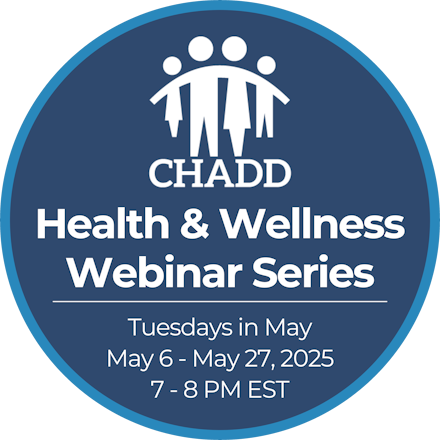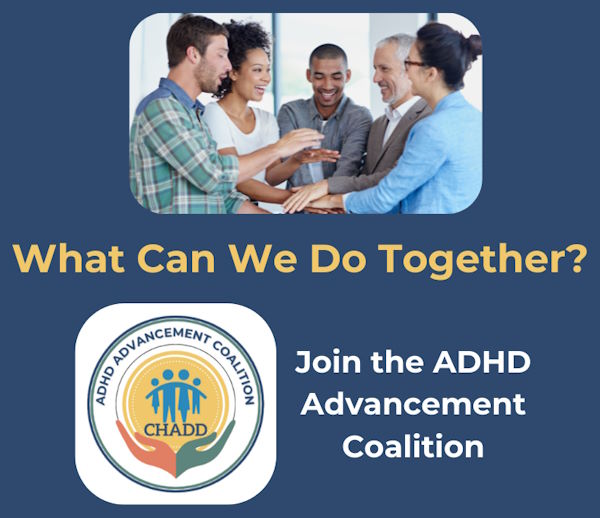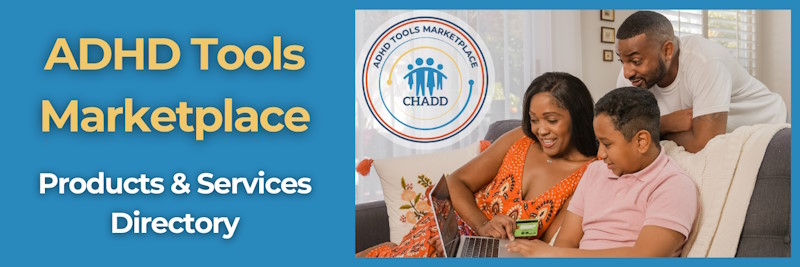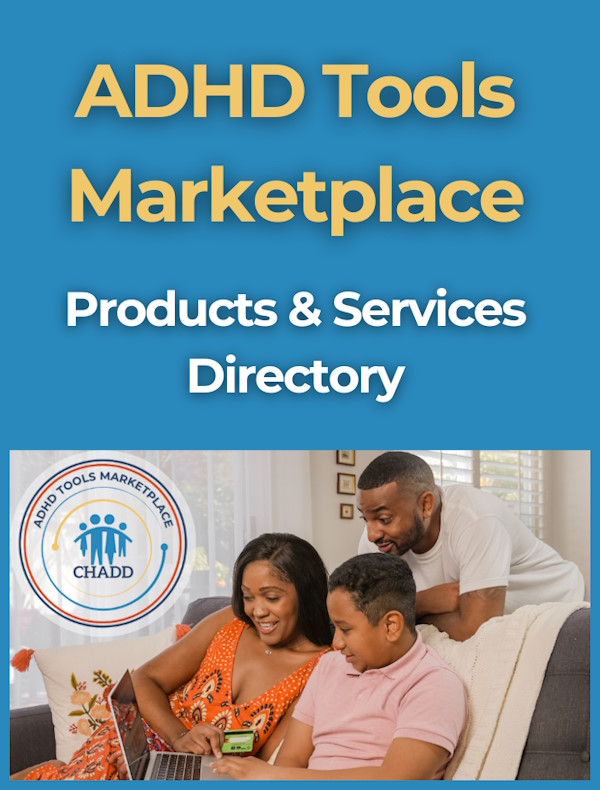-
-
-
Invest in Yourself
Navigate the complexities of ADHD with tools, strategies, and support for adults, parents, educators, and employers
EXPLORE TRAINING -
Leading the Way
The First Guidelines for the Clinical Diagnosis and Treatment of Adult ADHD in the United States
Learn More
For Adults
For Parents
For Teens
For Educators
For Professionals
Recursos en español
Contact ADHD Specialist
Monday–Friday, 1–5pm ET
CALL 1-866-200-8098
¿Necesitas recursos e información sobre el TDAH? Hable con un especialista de información en español.
Find a Local CHADD
CHADD has a nationwide network of Chapters. We encourage you to find a group in your area.
Training & Events
Adult to Adult Parent to Parent Teacher to Teacher Upcoming Events
ADHD Centers Directory
Find healthcare providers for ADHD in clinics located at universities and hospitals in your area.
Professional Directory
View our directory to find local ADHD professionals in your area.
Find a ProfessionalADHD in the News 2025-05-15
May 15, 2025No Causal Link Between Stimulants and Psychotic Experiences in Kids With ADHD
Why Are ADHD Rates So Much Higher in the U.S.?
Early vitamin D deficiency increases risk of ADHD, schizophrenia and autism
ViewADHD Weekly, May 1, 2025
May 1, 2025Why Look for Complementary Approaches?
Talking to Your Child’s Doctor About ADHD Treatment
Becoming an Adult and Managing ADHD
ViewEvents
-
Training on ADHD | Self-Paced Online Courses
November 1, 2024—November 1, 2034
Register -
Health and Wellness: Chasing Dopamine Counts as Exercise
May 20, 2025 | 7 PM ET
Register -
Health and Wellness: Improving Personal Care Habits with ADHD
May 27, 2025 | 7 PM ET
Register -
Understanding Neurodevelopmental Disorders After Epilepsy Surgery
June 30, 2025—June 30, 2025 | 2 PM PT/5 PM ET
Register -
ADHD Awareness Month
October 1, 2025—October 31, 2025
-
2025 International Conference on ADHD
November 13, 2025—November 15, 2025
Register -
A Productive Mindset that Keeps Showing Up Ask The Expert
May 22, 2025 | 2:00 EST
Register -
Health and Wellness with ADHD: Nutrition and Healthy Eating
May 13, 2025 | 7 PM ET
Register -
Health and Wellness with ADHD: Achieving Better Sleep
May 13, 2025
Register -
Health and Wellness with ADHD: A webinar series for adults with ADHD
May 6, 2025 | 7 PM ET
Register -
The Effects of Federal Healthcare and Education PoliciesCHADD Webinar
April 8, 2025 | 12 PM ET
-
The Role of Speech Therapy in ADHD Management Ask The Expert
March 24, 2025 | 2:00 EST
-
Identifying Misinformation About ADHD Ask The Expert
March 18, 2025 | 2:00 EDT
-
Support Your Child with ADHD Through TransitionsAsk The Expert
March 18, 2025 | 6:30 PM ET
-
ADHD in Military Families: Challenges, Support, and Strategies Ask The Expert
March 13, 2025 | 7:00 PM ET
-
ADHD2025 Online Conference
March 7, 2025—March 8, 2025
-
Emotions and Motivation with ADHD Ask The Expert
February 20, 2025 | 1:00 EST
-
Help Kids with ADHD Build Social Skills and Resilience in a Digital World Ask The Expert
February 5, 2025 | 8:00 EST
-
The Importance of Adult ADHD Guidelines: Is There Really an Increase In ADHD or Are Adults Finally Being Diagnosed?CHADD Webinar
September 24, 2024 | 12 PM ET
-
What Is ADHD? How It Affects Children and AdultsCHADD Webinar
July 23, 2024 | 12 PM ET
-
Using Context to Build and Enhance Executive FunctioningAsk The Expert
June 25, 2024 | 3:00 PM EDT
-
Questions & Answers – The Essential Elements that Guide Therapeutic Work within Latino Immigrant FamiliesAsk The Expert
December 26, 2023
-
Presentation – The Essential Elements that Guide Therapeutic Work within Latino Immigrant FamiliesAsk The Expert
December 26, 2023
-
Why A Mindfulness Reset Is So Powerful For Dealing With Resistant Or Adverse BehaviorsAsk The Expert
November 15, 2023 | 6:30 PM ET
-
Video Games and ADHD: Harmful or Helpful?Ask The Expert
October 12, 2023 | 7 PM ET
-
Learning Disabilities & ADHDAsk The Expert
August 15, 2023 | 7:00 PM - 8:00 PM CDT
-
Managing Stress for a Healthy FamilyAsk The Expert
August 14, 2023 | 1:00 PM
-
Cognitive Disengagement SyndromeAsk The Expert
July 26, 2023 | 3:00 PM, EDT
-
The Impact of Screen Time on Neurodivergent KidsAsk The Expert
June 1, 2023 | 12:00 PM - 1:00 PM EDT
-
Symptoms 101: An Overview of Comprehensive Diagnosis and Treatment PlanningAsk The Expert
May 24, 2023 | 3:00 PM, EDT
-
Sección 504 y IEP: Cómo preparar a sus hijos con TDAH para su éxito escolar Podcast
April 19, 2023—April 19, 2023 | 12:00 AM
-
Six Keys to Developing Executive Function Skills at School and at Home Ask The Expert
March 29, 2023 | 7:00 PM, EDT
-
Pregunte Al Experto: TDAH complejo con un enfoque en el síndrome de Tourette y el Trastorno de TicsAsk The Expert
March 9, 2023 | 7:00 PM, EDT
-
ADHD in Preschool: Placing All Young Children on a Path to SuccessAsk The Expert
March 7, 2023 | 5:00 PM EST/2:00 PM PST
-
How to Help Your Teen with ADHD Engage in Self-AdvocacyPodcast
February 15, 2023—February 15, 2023 | 12:00 AM
-
When Smart Children, Teens and Young Adults on the Autism Spectrum have ADHDAsk The Expert
February 15, 2023 | 8:00 PM, EST
-
Early Identification of Learning DifferencesAsk The Expert
February 8, 2023 | 3:00 PM, EST
-
Broken Resolutions? How Students with ADHD can Achieve Academic Success in 2023 without Lofty New Year’s GoalsAsk The Expert
January 31, 2023 | 7 PM Central Time
-
Section 504 and IEPs: Setting Your Child with ADHD Up For School SuccessPodcast
January 18, 2023—January 18, 2023 | 12:00 AM
-
Excited and Engaged: Strategies and Solutions for Social Anxiety in Children and Teens with ADHDAsk The Expert
January 18, 2023 | 7:00 PM, EST
-
Understanding and Responding to Your Child’s Resistance to LearningAsk The Expert
January 11, 2023 | 7:00 PM, EST
-
The Relationship Between ADHD and TraumaPodcast
December 22, 2022—December 22, 2022 | 12:00 AM
-
Managing ADHD and Disruptive Behavior DisordersPodcast
December 14, 2022—December 14, 2022
-
“I Can’t Focus!” When ADHD Impacts Your Child’s Math & Writing Performance Ask The Expert
December 7, 2022 | 7:00 PM, EST
-
ADHD and Toxic RelationshipsCHADD Webinar
October 26, 2022 | 5:30 - 6:30 EDT
-
Assistive Technology Supports for Managing ADHD – All About Apps for ADHD Life Ask The Expert
October 17, 2022 | 7 PM CT
-
How to Help Your Child with ADHD Create Healthy Eating HabitsPodcast
October 12, 2022—October 12, 2022
-
ADHD and Sibling RelationshipsShort Video
October 5, 2022—October 5, 2022
-
What Does Your Child Need to Know About ADHD?Short Video
October 5, 2022—October 5, 2022
-
Fathering with ADHDPodcast
September 28, 2022—September 28, 2022
-
Frenzied, Frazzled and Overwhelmed: The Interaction of Hormones and ADHD in Women in MidlifeCHADD Webinar
September 28, 2022 | 2:00 - 3:00 PM EDT
-
Identifying and Helping a Student with ADHD | Educators and ADHD CoachesCHADD Webinar
September 22, 2022 | 7:00 PM - 8:00 PM EDT
-
ADHD and Anxiety at School: For Educators Ask The Expert
September 14, 2022 | 3:00 - 4:00 PM EDT
-
Help Your Child with ADHD Manage Homework AutonomouslyPodcast
September 9, 2022—September 9, 2022
-
Working with Latino Patients and Their Families: For Treatment ProfessionalsAsk The Expert
September 7, 2022 | 12:00 PM - 1:00 PM EDT
-
Tips and Strategies for Educators to Help an Unmotivated Kid Ask The Expert
June 27, 2022 | 3:00 PM, EDT
-
Navigating College with ADHD, Preparing for SuccessPodcast
June 7, 2022—June 7, 2022
-
Help Your Teen with ADHD Prepare for and Navigate CollegePodcast
June 6, 2022—June 6, 2022
-
How to Help Your Child Overcome Executive Function ChallengesPodcast
June 5, 2022—June 5, 2022
-
Explorando el TDAH en las familias LatinasAsk The Expert
May 12, 2022 | 7:00 PM, EDT
-
Improving Social Executive Function Skills | Parents Ask The Expert
March 23, 2022 | 7:00 PM, EDT
-
Will ADHD Symptoms Improve with Marijuana Use?Podcast
March 16, 2022—March 16, 2022
-
Homework Solutions for Your Middle or High School Student Ask The Expert
March 9, 2022 | 7:00 PM, EST
-
Parenting a Defiant Child: Won’t? Or Can’t? Ask The Expert
February 16, 2022 | 7:00 PM, EST
-
ADHD and the “Just Right” RelationshipPodcast
February 14, 2022—February 14, 2022
-
Motivating an “Unmotivated” Child or Teen with ADHD Ask The Expert
February 9, 2022 | 7:00 PM, EST
-
5 Essential Ways to Have a Balanced and Healthy Relationship with Your Partner | Thriving with Adult ADHDCHADD Webinar
February 8, 2022 | 12:00 PM - 1:00 PM EST
-
ADHD and the Increasing Suicide Rate Among Black YouthPodcast
February 7, 2022—February 7, 2022
-
African Americans, ADHD, and Dysregulated Eating: What’s Going On?Podcast
February 1, 2022—February 1, 2022
-
Living Black with Undiagnosed and Untreated ADHDPodcast
January 31, 2022
-
Why Is Untreated ADHD Contributing to the Increasing Suicide Rate Among Black Youth?Short Video
January 31, 2022—January 31, 2022
-
Live in Harmony: Tips for Understanding a Partner with ADHDCHADD Webinar
January 12, 2022 | 12:00 PM, EST
-
Perfectionism and ADHD | Thriving with Adult ADHD CHADD Webinar
January 5, 2022 | 12:00 PM - 1:00 PM EST
-
Wait! Help your Child with ADHD to be Less Impulsive Ask The Expert
December 1, 2021 | 2:00 pm, EST
-
Becoming an Adult and Managing ADHDPodcast
October 28, 2021—October 28, 2022
-
Managing ADHD and Tourette Syndrome at School, College, Work and in the CommunityCHADD Webinar
October 19, 2021 | 7 PM ET
Register -
Embracing ADHDCHADD Webinar
October 16, 2021 | 9 AM CT (8 AM ET)
-
Creencias culturales y el manejo del TDAH en familias latinasPodcast
October 14, 2021—October 14, 2022
-
Women in Midlife and ADHDPodcast
October 5, 2021—October 5, 2021
-
Pregúntele al experto: Rompiendo la cadena de desregulación emocional en familias que tienen niños con TDAH Ask The Expert
October 5, 2021 | 12:30 PM EDT
-
Communicating with Your Child’s Teacher | Part Two of a Two-Part Series for ParentsCHADD Webinar
September 24, 2021
-
ADHD and the Struggle with Suicidal IdeationPodcast
September 17, 2021—September 17, 2021
-
Communicating with Your Child’s Teacher | Part One of Two Part Series for ParentsCHADD Webinar
September 17, 2021 | 3:00 PM, EDT
-
Latino Culture and ADHD TreatmentPodcast
September 14, 2021—September 14, 2021
-
Adult ADHD and Suicide PreventionPodcast
August 31, 2021—August 31, 2021
-
When Classes Resume—How to Help | For EducatorsAsk The Expert
August 31, 2021 | 7:00 PM, EDT
-
IEPs, 504 plans, and the New Educational LandscapeAsk The Expert
August 24, 2021 | 12:00 PM - 1:00 PM EDT
-
Overcoming Shame—Providing Perspective Through My ADHD Story Ask The Expert
August 9, 2021 | 12:00 PM - 1:00 PM EDT
-
Is Your Teen with ADHD College-Ready?Podcast
August 3, 2021—August 3, 2022
-
Strategies to Help Teens and Young Adults with Treatment CompliancePodcast
July 28, 2021—July 28, 2021
-
Strategies to Help with ADHD Treatment CompliancePodcast
July 26, 2021—July 26, 2021
-
Ongoing Support from Your Child’s DoctorPodcast
July 16, 2021—July 16, 2021
-
Supporting My Child with ADHD at SchoolPodcast
July 14, 2021—July 14, 2021
-
Promoting Mental Health for Black Communities | For Families, Parents & Professionals Ask The Expert
July 14, 2021 | 6:00 PM, EST
-
“Does My Child Have ADHD?” How to Talk with Your Child’s DoctorPodcast
July 13, 2021—July 13, 2021
-
Strategies for Setting Goals and Time Management | Webinar for Teens and Young Adults with ADHDCHADD Webinar
June 30, 2021 | 6:00 PM, EST
-
Do I Have to Talk to My Parents? ADHD, Adulting, and Conversations That Help, Not HurtCHADD Webinar
June 24, 2021 | 6:00 PM EDT
-
Teach Your Child Financial ResponsibilityCHADD Webinar
June 11, 2021 | 3:00 PM - 4:00 PM EDT
-
Break the Habit of DependencePodcast
June 10, 2021—June 10, 2021
-
Encourage Better Organization at HomeCHADD Webinar
June 10, 2021 | 12:00 PM - 1:00 PM EDT
-
Teach Your Child How to Set Goals and Manage TimeCHADD Webinar
June 9, 2021 | 7:00 PM - 8:00 PM EDT
-
Talking to Your Child’s Doctor About ADHD Treatment | ADHD Expert Webinar SeriesCHADD Webinar
June 8, 2021 | 12:00 PM - 1:00 PM EDT
-
Does My Child Have ADHD? | How to Talk with My Child’s Doctor CHADD Webinar
May 26, 2021
-
Is Boarding School Best for my Child with ADHD?Podcast
May 25, 2021—May 25, 2021
-
Managing Meds & Treatment Plans for Emerging YouthAsk The Expert
May 12, 2021 | 5:00 PM, EDT
-
Student Goal Setting | The How And Why For Parents & Teachers Ask The Expert
May 6, 2021 | 5:30 PM, EST
-
ADHD, Executive Function, and The Art of Getting Kids to Listen
April 28, 2021 | 7:00 PM, EDT
-
How to Find and Work with Your Doctor | for Youth + Young Adults
April 21, 2021 | 5:00 PM, EDT
-
Disparities in ADHD Care for BIPOC Children and Adolescents Ask The Expert
April 8, 2021 | 3:00 PM, EST
-
Time Management Interventions and Accommodations for People with ADHDCHADD Webinar
April 7, 2021
-
Self-Care Tips When Both You and Your Child have ADHDCHADD Webinar
April 6, 2021
-
Navigating College with ADHD | Preparing for Success!Ask The Expert
March 31, 2021 | 7:00 PM, EDT
-
Sex, Romance, and the Impact of ADHDPodcast
March 18, 2021—March 18, 2021
-
Adult ADHD: Impact on Chronic Conditions and Adherence to Medical Recommendations
March 16, 2021 | 4:30 p.m.
-
Black Adults Who Live With ADHDPodcast
March 15, 2021—March 15, 2022
-
The Risks of Misusing Stimulant Medication and AlcoholPodcast
March 15, 2021—March 15, 2021
-
Challenges in ADHD Care for Children of Color Pt 1Podcast
March 15, 2021—March 15, 2021
-
Your Next Steps | College and Career Prep for Young Adults with ADHDCHADD Webinar
March 3, 2021 | 7:00 PM, EST
-
Life Skills to Help Your Child’s Growth | Parents of High School + College Students Ask The Expert
February 16, 2021 | 2:30 PM, EST
-
Finding More Happiness for Both Partners When One Person has ADHDCHADD Webinar
February 10, 2021 | 7:00 PM, EST
-
ADHD Medication and College Students: Prevent Misuse, Abuse, and DiversionCHADD Webinar
January 29, 2021 | 12:00 PM, EST
-
Homework, Organization, and Time Management Strategies to Help Kids with ADHDAsk The Expert
January 28, 2021 | 11:00 AM, EST
-
ADHD and Curbing Impulsive Spending to Help Your Relationship Ask The Expert
January 20, 2021 | 7:00 PM, EST
-
Mindfulness, Stress, & Emotion Ask The Expert
December 16, 2020 | 7:00 PM
-
Online Learning | Teaching Students How to “Work From Home”Ask The Expert
September 9, 2020 | 7:00 PM, EDT
-
I Can’t Make Friends By Myself: How to Improve Social Interaction for Teenagers with ADHDAsk The Expert
September 2, 2020 | 7:00 PM, EDT
-
“Off You Go!” Helping Your Teen Navigate the Transition from High School to the Next ChapterAsk The Expert
August 19, 2020 | 7:30 PM, EDT
-
Reduce Challenging Behavior in Your Child with ADHD – Collaboration & Problem Solving (CPS)Ask The Expert
July 13, 2020 | 11:00 AM
-
ADHD and Executive Functioning – Setting Realistic Goals Ask The Expert
July 9, 2020 | 12:00 PM - 1:00 PM EDT
-
Teens & Parents: Understanding Strategies to Reduce Conflict Ask The Expert
June 3, 2020 | 5:00 PM
-
Mindful ParentingPodcast
April 27, 2020—April 27, 2020
-
Navigating Relationship ChallengesPodcast
April 9, 2020—April 9, 2020
-
Managing AnxietyPodcast
April 3, 2020—April 3, 2020
-
ADHD Diagnosis & Treatment Guidelines – Information for ParentsAsk The Expert
March 31, 2020 | 2-3:00 PM EDT
-
Parents – Help Your Child to Be Angry BetterAsk The Expert
March 26, 2020 | 12:00 PM - 1:00 PM EDT
-
ADHD and Suicide Risk Factors | Clinical Considerations for TreatmentAsk The Expert
November 8, 2019 | 10:15 AM
-
Mornings Matter with ADHDCHADD Webinar
November 1, 2019 | 12:00 PM - 1:00 PM EDT
-
Ask The Expert: Lonely, Bullied & Left Out: How To Help Your Child’s Social SkillsAsk The Expert
August 21, 2019 | 2:00pm, ET
-
Meeting the Needs of Students with ADHD in the ClassroomAsk The Expert
August 13, 2019 | 2:00pm, ET
-
Neurofeedback Treatment for ADHDAsk The Expert
July 18, 2019 | 2:00pm, ET
-
Who’s On The Bike: Your Guide To Building IndependenceAsk The Expert
July 16, 2019 | 2:00pm, ET
-
4 Common Problems in ADHD Treatment for Teens and AdultsCHADD Webinar
June 13, 2019 | 2:00pm, ET
Register
Limited to 500 Participants -
ADHD in Preschoolers: What to Look For and How to HelpAsk The Expert
May 16, 2019 | 2:00pm, ET
-
What Can I Expect As an Adult From My ADHD Treatment Over The First 6 MonthsCHADD Webinar
April 18, 2019 | 2:00pm, ET
-
Ask the Expert: A Summer at CampAsk The Expert
March 19, 2019 | 2:00pm, ET
-
Understanding and Applying the Science of Time ManagementCHADD Webinar
February 7, 2019 | 2:00pm, ET
-
Ask The Expert: Disclosure and Workplace Accommodations for Individuals with ADHDAsk The Expert
February 5, 2019 | 2:00-3:00 pm, ET
-
Ask the Expert: Couples with ADHD: Creating Caring Connection Amid the ChaosAsk The Expert
January 25, 2019 | 3:00pm, ET
-
Special Presentation: Health and Life Expectancy in ADHD—Treatment Matters More Than You ThinkAsk The Expert
January 15, 2019 | 1:30-2:30pm, ET
-
Ask the Expert- Goal Setting, and keeping, for the ADHD BrainAsk The Expert
December 12, 2018 | 2:00pm, ET
-
Ask the Expert Educator Edition: Managing Challenging Classroom Behaviors in Early Elementary Students with ADHDAsk The Expert
December 11, 2018 | 2 p.m. ET
-
Ask the Expert: Video Games, Screens and ADHD—A Potent MixAsk The Expert
November 15, 2018 | 2 p.m. ET
-
Ask the Expert: ADHD & Executive FunctioningAsk The Expert
October 30, 2018 | 2:00 PM - 3:00 PM ET
-
Ask The Expert: Late Lost and Unprepared: How to Help Your Child or Teen with Executive FunctioningAsk The Expert
August 29, 2018 | 2:00 PM
-
Ask The Expert: Past Procrastination: Get Your Kids Organized, Focused and Motivated…without Being the Bad GuyAsk The Expert
August 14, 2018 | 2:00 PM
-
Ask The Expert: Nutrition in Support of ADHD TreatmentAsk The Expert
July 24, 2018 | 2:00 PM
-
Ask The Expert: How to Build Self-Motivation in Teens with ADHDAsk The Expert
April 19, 2018 | 3:00 PM
-
Ask The Expert: What You Need to Know About Students with ADHD and AnxietyAsk The Expert
March 15, 2018 | 3:00 PM
-
Ask The Expert: How to Select the Best School Accommodations for Your Child with ADHDAsk The Expert
February 6, 2018 | 2:00 PM
-
Strategies for Promoting Positive Behavior in Children with ADHD and Their Siblings Ask the Expert
November 16, 2017 | 1:00 PM
-
The Choice is in the Details: Medication Options for ADHDAsk the Expert
October 17, 2017 | 2:00 PM
-
Ask the Expert: 5 Solutions to Common ADHD Social StrugglesAsk The Expert
October 4, 2017 | 3:00 PM
-
Ask The Expert: Make Learning Exciting: Apps for Executive FunctioningAsk The Expert
August 1, 2017 | 3:00 PM
-
Ask The Expert: Project-Based Learning and ADHDAsk The Expert
June 21, 2017 | 3:00 PM
-
Ask The Expert: Behavioral Therapy: What it is and finding a therapistAsk The Expert
June 6, 2017 | 2:00 PM
-
Ask The Expert: Teaching Grit, Perseverance and Frustration Tolerance To Students with ADHDAsk The Expert
April 25, 2017 | 7:00 PM
-
Ask The Expert: Improve Homework Time with Strategies That Work For ADHDAsk The Expert
March 23, 2017 | 2:00 PM
-
Ask the Expert: Five Ways Nutrition Can Affect ADHD SymptomsAsk The Expert
February 22, 2017 | 2:00 PM
-
Is My High School Student Ready for College? (And Is My College Student Ready to Go Back?)Ask The Expert
February 8, 2017 | 2:00 PM
-
Ask The Expert: Tourette Syndrome and ADHD: Starting a New Year with Health, School and Home supportsAsk The Expert
January 19, 2017 | 1:00 PM
-
Ask The Expert: Department of Education Guidance Broadens Understanding of 504 Rights for Kids with ADHD: Part IIAsk The Expert
November 7, 2016 | 3:00 PM
-
Ask The Expert: Creating the Best Learning Environment for Students with ADHDAsk The Expert
November 3, 2016 | 4:00 PM
-
Ask The Expert: Department of Education Guidance Broadens Understanding of 504 Rights for Kids with ADHD Part IAsk The Expert
October 25, 2016 | 3:00 PM
-
Ask The Expert: What Everyone Should Know About ADHDAsk The Expert
October 5, 2016 | 1:00 PM
-
Ask The Expert: Getting Through to your Teenager with ADHDAsk The Expert
September 20, 2016 | 2:00 PM
-
Ask The Expert: Building partnerships with parents and caregiversAsk The Expert
August 30, 2016 | 2:00 PM
-
Ask The Expert: Tailoring learning settings to engage young children with ADHDAsk The Expert
August 16, 2016 | 2:00 PM
-
Ask The Expert: Classroom management supports for ADHD behaviors in early childhood education settingsAsk The Expert
August 2, 2016 | 2:00 PM
-
Ask The Expert: Recognizing challenging behaviors in young children: Could it be ADHD?Ask The Expert
July 19, 2016 | 2:00 PM
-
Ask The Expert: Helping your child successfully handle changeAsk The Expert
July 14, 2016 | 2:00 PM
-
Ask The Expert: Evidence-based treatment for ADHD in young childrenAsk The Expert
May 23, 2016 | 1:00 PM
-
Ask The Expert: Your Student Was Admitted, Now What?Ask The Expert
May 18, 2016 | 2:00 PM
-
Ask The Expert: What Else Can I Do? Lifestyle Support for ADHDAsk The Expert
March 8, 2016 | 2:00 PM
-
Stop the chaos! Tips for creating a peaceful household when mom has ADHDAsk The Expert
February 3, 2016 | 2:00 PM
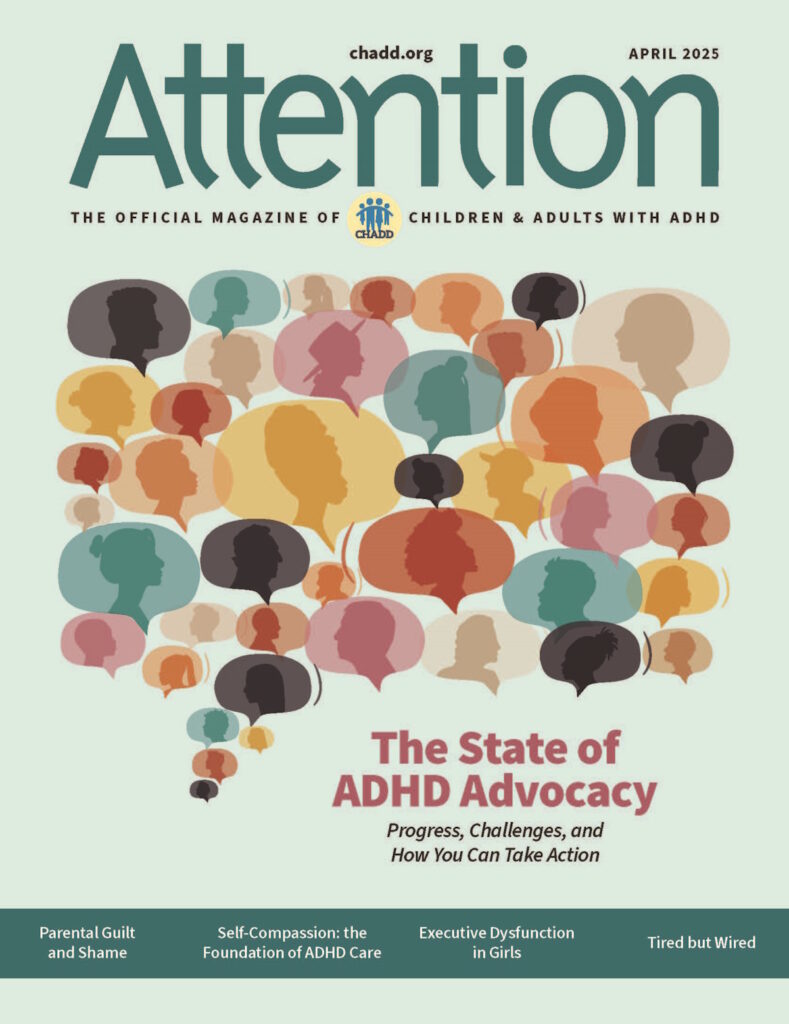
Attention Magazine
Recognized for its excellence, CHADD’s bimonthly magazine is rich in practical information, clinical insights, and evidence-based strategies for managing ADHD.
LEARN MOREMembership
CHADD membership makes the Difference. When you become a member, you become part of our mission to improve the lives of those affected by ADHD.
Become a Member
Donate
Every dollar you give, whether large or small, makes a difference in the work we do. Your donation ensures CHADD can keep the focus on all things ADHD.
Donate Today
Volunteer
CHADD’s dedicated volunteers play an integral part in the organization’s success by providing support, education and encouragement to parents, educators and professionals.
Ways to Volunteer
Chapter Services
CHADD has a nationwide network of Chapters. We encourage you to find a group in your area. This is the best way to connect with resources and find a local ADHD support group that you can share with.
Find a Chapter

